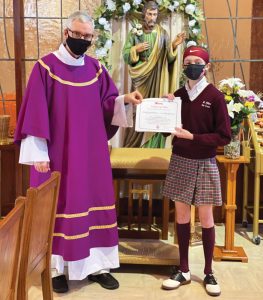2020 Essay Contest Winners
FROM ST. ALBERT THE GREAT SCHOOL: PASTOR MSGR. JOSEPH DUNCAN, PRINCIPAL MRS. SANDRA MCDEVITT, DIV. I AWARD WINNER DANIELLE CARRADORINI TOGETHER WITH DN. KEVIN MCCARTHY, MARYKNOLL MISSION EDUCATOR
Referencing Pope Francis’ call to “build a civilization of love,” we asked students to explain what they think the pope means by that phrase, how they have seen people building a civilization of love during these extraordinary times and how they will do so going forward. We received 2,743 essays from students competing in two divisions (grades 6-8 and grades 9-12). Following are the winning essays.
Navigate to:
DIVISION I (Grades 6-8)

1st Place - DANIELLE CARRADORINI
A Civilization of Love Includes Everyone
The coronavirus has affected many aspects of our lives, not only in America, but throughout the world. As Catholics, we are called to respond to these stressful and dividing times with Christian love. In Pope Francis’ address on Sept. 9, 2020, he talks about how we all need to contribute to building a “civilization of love.” The pope believes that the pandemic is giving us an opportunity to create a more “healthy, inclusive, just and peaceful society.”
According to Pope Francis, a “civilization of love” is one in which everyone is included. The love that we need to have for relationships to flourish starts in the home with the family. Pope Francis calls us to share that love and let it spread into social, cultural, economic and political relationships. As a “civilization of love,” we cannot overlook the vulnerable or do something just because there is a benefit in it for us. Relating to the coronavirus pandemic, businesses shouldn’t be developing vaccines as a money-making venture, but rather out of love for the people who need them. We must show “the best in our human nature and not the worst.” Also, in association with the election, we shouldn’t try to divide people, worsen the conflict, or seek benefits for ourselves when voting. According to the LiCAS.news website, the pope said that “…love must be unconditional and must be expressed even toward perceived enemies.” The same website also reports the pope saying, “… inclusive love can generate social structures that encourage us to share rather than to compete.” Instead of competing to be the first to develop a vaccine, keeping it for ourselves, and not sharing it with other countries, we can share the medicine for the good of all people and not have such an egotistical mindset. The just society, that Pope Francis speaks of is one that includes all people, doesn’t overlook individuals, and encourages sharing instead of competition or self-centeredness.
We can see, especially during these times, a number of people who are helping to build a society of love. One way people have done this is by making an effort to support small businesses that are struggling because of the pandemic. Supporting them both economically by buying from them and emotionally by sending them letters and kind words is helping to spread love to them. Another way people are helping to build a “civilization of love” is by feeding the hungry. Many people are giving food to and volunteering at food banks. This is showing the part of the pope’s vision which is sharing and not being selfish. The volunteers do not get paid for the work they do, and the givers of the food are sharing their goods with others who need it. Also, at the beginning of the pandemic, people were giving cards and gifts to the residents of nursing homes to make sure that they knew they were not forgotten. This shows that the usually overlooked and vulnerable people in nursing homes are being cared for and noticed by lots of people. When good people work together, the “civilization of love” grows.
Since every person is included in the “civilization of love,” it is important that we all contribute to the making of it. Going forward, I can help to build it by abiding by all the precautions put into place for both my school life and life at home. Even if I don’t want to, or I am not at risk, I will do it to protect everyone around me. I can also help my mom make dinners for healthcare workers who are working so hard on the front lines dealing with COVID-19 patients. Another thing I can do to build a society of love is to pray for the dying. I can pray to Saint Joseph, who is the patron saint of a happy death, because many of the people dying of the coronavirus are dying alone because family and friends are not allowed to visit them.
To conclude, as Christians, we are called to be the hands and feet of Jesus to the world. We have to respond with love to these unusual and divisive times. If we do, we can emerge from this pandemic, as the pope believes, a better and more loving civilization.
Danielle Carradorini, a seventh-grader at Saint Albert the Great School in Huntington Valley, Pennsylvania, wins the first-place Bishop Francis X. Ford Award for Division I of the Maryknoll Student Essay Contest.

2nd Place – AMY POTTS
Grade 7 | Morgantown House School | Morgantown, West Virginia
Citing examples of people in her community helping others this year, Amy says, “We need to combat this pandemic with the virus of love.” But, she acknowledges, love needs to start at home. She plans to build a civilization of love beginning with small things. “I can wash the dishes, clean my room or look after my little brothers,” she says.
Spreading Love
“What the hell are you doing?” Joe looks up at me and grins. Four of us are carrying him outside in his wheel chair and he does not like being carried down the steps. Joe is our neighbor and suffers from Alzheimers. It is his 95th birthday and my family and I have decided to throw a birthday bash for him. It is the first time that he and his wife Catherine have been out of the house since Covid struck. (Well, not the first time for Joe – he has been to the hospital two or three times.) We decided to have a socially-distanced birthday party in their back yard. My dad is one of Joe’s caregivers and we were so excited to surprise them for his birthday.
Joe and Catherine have been house-bound, due to the Corona Virus that is shaking our world. I worry that my family members might get sick. My grand parents are old; my grandfather has already had a stroke. A lot of people are afraid. Being afraid will not help. Pope Francis calls us to build a civilization of love. Love will cast out fear.
As well as the pandemic, the election has turned our country into turmoil. We can’t wait until the pandemic disappears or the election fuss stops to start building a civilization of love. We have to start now. There are many ways to do this. My local Salvation Army made hygiene kits and gave them to the homeless who have nowhere to wash their hands. My church does a virtual Bible study each week. It is great to see everyone’s faces, even though it’s not as good as meeting face to face. I read about a fire department that gives celebratory rides to local kids for their birthday. Halloween could have been cancelled, but, instead, we found creative ways to keep going: tables in front of our houses with bags of goodies!
I believe we need to combat this pandemic with the virus of love. But, love does not come easy. I have a hard time loving my neighbor, who yells at me and my sister when we play too loud. If my little brother ruins my art project, I have a hard time loving him. So, before I and we can spread love throughout our country and world, it needs to start at home.
My family and church have found creative ways to reach out to others during this pandemic. One of my favorite activities is getting outdated flowers from Krogers and bringing them to old, house-bound people. It is so rewarding to see their faces break into smiles when we deliver a bouquet.
Our school closed this March, due to the Corona Virus. Like many others in the world, we switched to distance learning. I missed my teachers and friends, but we found ways to keep in touch. My sister and I baked cookies and delivered them to our school, where our teachers were working hard to keep us going.
Even if I never do anything heroic or huge, I can build a civilization of love by starting to do small things. I can wash the dishes, clean my room or look after my little brothers. If I do these things, I will be part of everyone else who is quietly and determinedly building up a new civilization. As the Pope points out, what happens in the home, in the neighborhood, in the country and internationally: all these seeds of love that are being planted will grow and bear fruit.

3rd Place – DELANEY BUCKEL
Grade 8 | Ss. Simon and Jude Cathedral School | Phoenix, Arizona
For Delaney, building a civilization of love means putting our own needs aside to help others. Among the many who have done that during this pandemic, she mentions health care workers and people buying groceries for elderly neighbors. She too wants to share her gifts with those in need. “We all take part in making our world a better place,” she says.
A Needed Alteration
The events of 2020 have not only changed our world, they have magnified egoism in our society. As stated best by Pope Francis, “If the solutions to the pandemic carry the mark of egoism, perhaps we will get past the coronavirus, but not the human and social crises that the virus has brought to light and accentuated. ” So how do we get past the human and social crises? We answer the Pope’s call to build a “Civilization of Love.” To me, this means we need to put our own needs aside and help others! Pope Francis wants us to be social and welcoming to everyone we meet in these extraordinary times. There are numerous examples of people building a “civilization of love” by being good stewards and I hope to do the same. During this unprecedented period, stewards have offered their time, services and financial resources to others. For example, they have been buying groceries for elderly neighbors since they are considered at high risk for the Coronavirus. The simple act of giving their time to assist the elderly with household tasks could be saving their lives! As we get older we are prone to illness and it is harder to be mobile, so these small acts of kindness mean so much more.
Similarly, health workers have been offering their services and risking their lives to improve others wellbeing. Doctors and nurses are not just helping those affected by the coronavirus, they are inspiring others by their brave acts and selflessness during this pandemic. These acts of pure love show their patients they’re loved and cared for even through the worst of times. Finally, the whole world joined together to help and donate anything they could during the Australia fires.
When Australia was in need, civilization didn’t wait, we took action to help! We support each other in our time of need, no matter our differences. While these were examples that we’ve seen recently, there are many ways I can build a civilization of love too.
Such a civilization can be built through donation, leading by example and prayer. I can donate my time, goods, or services to help the less fortunate. I would consider myself privileged compared to some who may be suffering from homelessness, hunger and loneliness. I want to share my gifts with those who need it. I’ll volunteer to serve dinner at Saint Vincent de Paul, once it’s open, and donate some of my clothes and toys. There are so many people that need help, especially all those that lost jobs during the pandemic. Small acts of kindness can truly turn someone’s day around and provide hope. I can help convince others to build a civilization of love through leading by example.
The Christian example still happens today through welcoming and being accepting of others, and living a Christ-like life. By showing acts of selflessness, hopefully, I can inspire others to do the same. There are many people who want to help, but may not know how. Hopefully, leading by example will show them the way. Lastly, I can pray for those who need the most support in today’s world. Prayer is one of the best things we can do. Miracles occur through prayer. We can save someone physically or spiritually. In times of despair, there is so much we and others can do to create a civilization of love.
In conclusion, we all take part in making our world a better place. There is so much we can do to lend a helping hand and be good stewards. The Corona Virus is just a chapter in the book of life. Our world can be scary from time to time, but we have each other to lean on in our civilization of love.
Navigate to:
DIVISION II (Grades 9-12)

1st Place – CONNER CRUISE
Neighbors Help Neighbors Build a Civilization of Love
In a world separated by political ideology, culture and now an invisible six-foot social distancing bubble, finding a “civilization of love” seems like a far-fetched goal. Together, however, we can begin the road towards love, hope and a community-wide family. We need a civilization not built on personal gain and greed, but one designed on the principles of kindness and compassion. We yearn for a society built not on arrogance and ignorance, but one shared upon knowledge and faith. We live in a civilization whose roots stem far into dishonesty and cruelty. Pope Francis calls us to amend that, and shower the roots with hope and love so that our community may grow stronger and taller. The pope’s message is directed towards finding a way where neighbors can love neighbors, and people learn to respect and appreciate the values of others who have different viewpoints, even though you do not always agree with them.
I have witnessed, firsthand, a community of hope and love. On the afternoon of Monday, August 10, a severe weather complex known as a “derecho” sent intense winds and thunderstorms over a 700-mile stretch of the Midwest. My hometown of Cedar Rapids was severely impacted, with more than 800 buildings suffering at least partial collapse. Nearly every home and business was damaged, and roads were impassable due to trees, debris and downed power lines. An estimated 500,000 people throughout Iowa were without power for many days. In the aftermath of the storm, Cedar Rapids was in desperate need of repair and clean-up. It started within each individual neighborhood, as families rallied together to get the streets and yards clear of debris. People loaned battery-powered generators and power saws to those in need. My high school mobilized volunteers to help within the greater community. A group of high school friends and I went from home to home helping cut down and remove trees and rubble from yards. We took ice, water and other necessary supplies to people in need. It was an incredibly powerful experience watching neighbors and members of the community rally together to help those who were severely impacted. We heard stories that broke our hearts while at the same time, inspiring and strengthening our resolve and determination. When Pope Francis speaks of a “civilization of love,” I recall this powerful experience. Our civilization, one like many others, came together, not for personal satisfaction or gain, but to love and serve others in our community. This experience has shown me the true love that a community can have for each other. Pope Francis calls us to spread this love to all civilization. We are all a unified people under God.
Love, like nerve networks in our brain, weaves itself into billions of different short pathways in the community, usually only reaching as far as extended family. The pope calls for us to fill in the gaps in the pathways and build a connected blanket of love that stretches as far as there are living things. I, personally, am only one out of seven and a half billion people.
However, as one individual I can impact and love others in my community and abroad. God calls us to love one another. “A new command I give you: Love one another. As I have loved you, so you must love one another. By this everyone will know that you are my disciples if you love one another” (John 13:34-35). Everyone who calls themselves a follower of Christ is called to walk in love. We are called to love wholeheartedly and sacrificially, as God loves us. It is my fervent desire to give the very best of myself, as Jesus did for me. Each and every day I plan to look for new opportunities to show God’s love for all of mankind and help build a worldwide civilization of love.
Conner Cruise, a 12th-grader at Cedar Rapids Washington High School in Cedar Rapids, Iowa, wins the first-place Bishop Patrick J. Byrne Award for Division II of the Maryknoll Student Essay Contest.

2nd Place – EMILY ARTMAN
Grade 12 | Green Mountain High School | Lakewood, Colorado
To illustrate that building a civilization of love often consists of small moments of kindness, Emily shares the story of her 8-year-old cousin comforting a lost child. “I saw Jesus working through her that day,” Emily says of her cousin, “and it serves as a reminder to me that through compassion and love even the darkest moments can be broken with light.”
Jesus at the Zoo
Jesus gave us many teachings and in sifting through those teachings, I think that some of us have lost the light that led us to Christ in the first place. It is easy to look at the world and the state of our society and cast a blanket of doubt, to say that God has no plan, and not assume any of the responsibilities ourselves. There is no doubt that God has a plan for every one of us, and through this turmoil, he meant for us to grow and be better people than we had ever imagined. We are all called through Jesus to release our burdens and let Him guide us through a life we cannot hope to understand on our own. Within this turmoil, however, we have strayed from his original and most fundamental teaching, which is to love each other in the way that he loves us. When Pope Francis called us to “build a civilization of love” he was bringing us back out into the light and reminding us that although we are the beloved children of God, it is more important than ever to spread that love to everyone we meet.
We often think of love as big gestures, a proposal, a mission trip, wedding vows, presents, or a candlelit dinner. The truth about love, however, is that it is often found in the small moments of kindness that one person shares with another. When I think about this, my 8-year-old cousin comes to mind. We were at the zoo over summer break and over the roar of the lions, we could hear the shrill cries of a little boy. He had lost his parents in the crowd and was terrified. This boy, who was maybe only a year older than my cousin, was being ignored by everyone that passed him by, but not her. She instead made a direct line for this boy and asked why he was crying. Upon following her, we learned that he was lost and everybody’s maternal instinct sprang into effect. She, however, held the boy’s hand as he cried and hugged him to steady him so that he could calm down enough to help us find his parents. While we were worried about finding his parents, my little cousin was worried about him. She didn’t release his hand until he found his mom and dad, and kept saying over and over again, “I promise that I will not leave until you are safe with mommy and daddy.” Her act of kindness inspires me and the astonishing thing is that she didn’t think twice about it. While the world seems to be surrounded by grey, my little cousin saw only black and white. She saw someone in distress and knew immediately that she had to help. I saw Jesus working through her that day and it serves as a reminder to me that through compassion and love, even the darkest of moments can be broken with light.
It is impossible to know what everyone is going through and what burdens they carry. Grand gestures are nice, don’t get me wrong, but the tide of someone’s day can be changed through mundane acts of love. Telling your mom that you love her, calling your relatives after they send you a card for your birthday, holding the door for a stranger, or thanking a veteran for their service. These seem like small acts, but I think that Pope Francis was trying to remind us that only through these seemingly insignificant acts of love can we all truly be united again. We need to remind ourselves why we follow God in the first place; because he loves us and now it is our job to love each other.
Moving forward in my life, I need to remind myself to set aside religious, social, political, and economic differences in order to spread a message of hope to those who are weary of the constant turmoil of modern society. To do this, I must take an active role in my faith, but the beautiful thing is that you do not have to be Christian to move towards a civilization of love. By embracing the culture of life and standing with those most marginalized by modern society, we all can change the tone and direction of our culture. Regardless of our differences, we can come together on the centrality of loving and caring for others.

3rd Place – ADAM DURR
Grade 11 | Lansing Catholic High School | Lansing, Michigan
In a civilization of love, says Adam, all are welcome. This year, he points out, society has been forced to consider the pain of those who have been excluded. “All around the world we see people coming together, striving to help, passionately calling for justice,” he says. He promises to join those efforts to build a world where all are loved.
I’m fond of a song that was a favorite of my childhood parish, and I’m sure many people reading this know it well; “All Are Welcome.” Its’ soaring optimism by equal measures inspires and captivates me every time I hear it, and it was a favorite of mine as a child. Hearing it as a young kid sitting in the pews of St. John’s Church, it was easy to be optimistic. It was easy to think that’s all the world was, or at the very least where society was inevitably going. ln the time since, we’ve seen our fair share of struggles, but today, as I write this, older, more knowledgeable, with all my naivety gone, no stranger to disillusionment, I remain as optimistic as ever, but more firmly set in my convictions that we can build that world of unity and understanding, of social and political harmony that Pope Francis so eloquently summoned us to, a civilization of love.
A civilization of love is a hard thing to build, but we’ve certainly got plenty of practice.
Our nation was founded by reformers, its earliest colonies settled by those seeking to build utopias, and our history and country have been shaped by incredible movements for social justice that have little by little brought us closer to that ideal. Their work remains unfinished but by their work we are getting closer and closer to that shared goal, and we know what we must do to get there.
In writing this essay, I’ve been thinking a lot about a quote from Dr. King, who said “The
law cannot make a man love me but it can stop him from lynching me.” A civilization of love will not come from writing love into law because love cannot be written into law. We certainly must immediately make this a place where everyone can live safely, but we cannot stop there, because that alone does not make a society; a society of love. Instead Dr. King’s dream, so fundamental to the hope of our nation and to us as a people, that calling which Pope Francis declared, that civilization of love will be built brick by brick in heart by heart of everyone.
This year has been a crazy one. It’s changed our world in innumerable ways, and has forced us to reckon, face to face, with the problems that have often willingly evaded society’s notice. The too often ignored pain of those targeted, discriminated against and even killed because of their race. The continued plight of the less fortunate, while the power to change is held by those who, for removal from such feelings, look away. Continued problems of the unwelcomeness felt by our brothers and sisters in the LGBT+ community, immigrants and those struggling for freedom around the world.
But this incredible moment has compelled many to step up and get to work building that civilization of love. All around the world we see people coming together, striving to help, passionately calling for justice and refusing to let such problems ever again go ignored. All it takes to solve these is more empathy, more love in our world and in our hearts. Problems like these are all that hold us back from that as of yet mythical place articulated by so many, that is ever within our collective grasp.
But it is only within our collective grasp. All cannot be welcome until all welcome. And to build a place where all people love and are loved, we must pair the call to look outward with the call to look inward. We must seek to change and open our hearts as we seek to change the hearts of others. We must recognize our own faults and we must recognize society’s faults because that is the only way to overcome them. And we must come together. To change the world, one must change the world. And no one can do that alone. We must do that together, and in coming together we bring about that civi1ization of love. We must not waste these incredible times, this incredible opportunity we’ve been given, face to face with everything we need to change, to unite and change it. That is what I promise to do. To dedicate myself in everything I do to reaching out to others, to giving everything I can to build that better world and to reverberate the call. I hope to join you in doing that.
